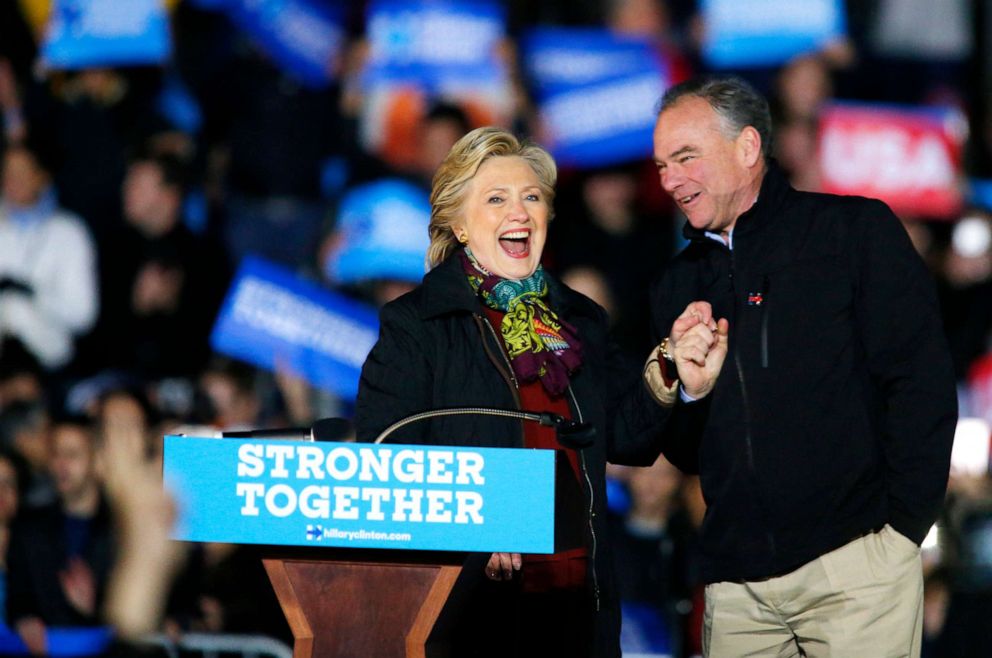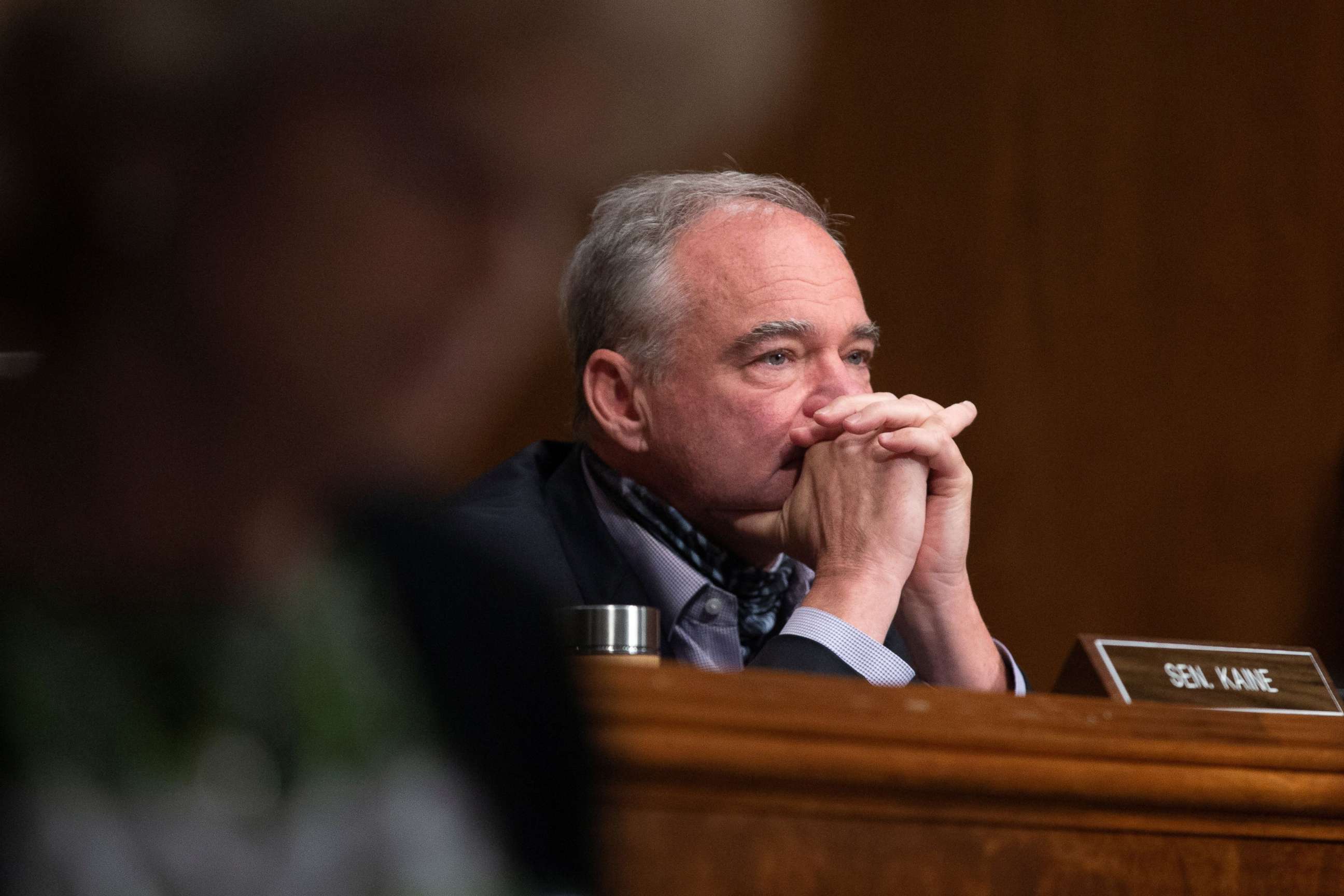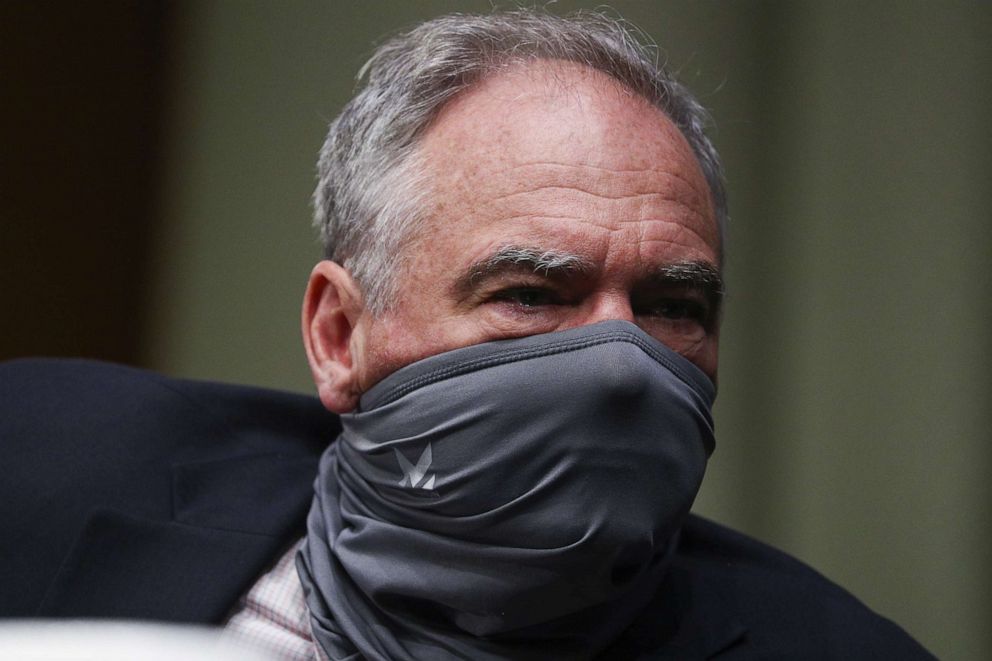Sen. Tim Kaine ties sexism to 'ambition' criticism of potential VP contenders
Kaine likens scrutiny of VP contenders to attacks of Hillary Clinton in 2016.
Sen. Tim Kaine, Hillary Clinton's 2016 running mate, reflected on the vice presidential vetting process in an interview with ABC News' "Powerhouse Politics" podcast, and discussed how the women on former Vice President Joe Biden's shortlist may be feeling ahead of his pick.
The senator from Virginia has an unusual amount of first-hand experience with the vetting process. Before being selected as Clinton's running mate in 2016, Kaine was among the finalists identified by then-Sen. Barack Obama for his ticket in 2008. Obama ultimately chose Biden and reportedly told Kaine, "You are the pick of my heart, but Joe is the pick of my head."
Amid reports that claim some Biden donors have said Sen. Kamala Harris, D-Calif., was "too ambitious" to be vice president, Kaine likening it to the scrutiny Clinton endured in 2016.
"The ambition theme that's popped up in recent weeks is just a sad part of what I saw with Hillary running for president in 2016," said Kaine. "We have a double standard for women."

"The hardest part of being on the ticket with Hillary in 2016 was just the endless display of outright misogyny or subtle double standards that demonstrated to me -- absolutely clearly -- why we haven't had a woman president and why the United States has still such a poor track record of electing women to national legislative office," he continued.
At this point in the vetting process, Kaine said the contenders may feel vulnerable to negative stories and leaked opposition research.
"You're out on a diving board -- kind of by yourself -- and if anybody has an arrow they're going to fire at you, the campaign kind of wants to see it fire," said Kaine. "They want to know what's out there and they want to know how you respond. They want to know, 'Do voters think this is a serious issue or is that so minor, who cares about that?'"
Kaine explained that in order to do no harm to the presumptive nominee, it's actually important for these kinds of negative stories to come out ahead of the pick being announced. He described the process as "necessary" and "nerve-wracking."
"You want any of those arrows fired before you name somebody rather than after," said Kaine. "Let's make sure we understand all the downsides that everybody has because everybody has them. Let's make sure we understand them all before we make a pick."

Over the weekend, vice presidential hopeful California Rep. Karen Bass received blowback after reports unearthed a video of her address at a 2010 Scientology church opening. She has also been criticized for referring to Fidel Castro as "comandante en jefe," which many believe is a term of endearment for the dictator and for work she did in the 1970s in Cuba with a group that sends leftist students to the island nation annually. In interviews on Sunday political talk shows, Bass said, "lesson learned" and said she'd evolved on the subject after conferring with colleagues in Florida.
Kaine said these kinds of attacks have a myriad of sources.
"Negatives come out from every different direction. They come out from enterprising reporters. They come out from -- sometimes the candidates themselves want them out there so it's not a surprise later. They definitely come out from rivals," said Kaine. "And sometimes the campaign itself."
Kaine offered insight on the very public nature of this vetting process given the realities of campaigning amid the coronavirus pandemic. Many of the women said to be under consideration for the number two spot have participated in virtual campaign events and fundraisers, in addition to a host of news interviews and television appearances. Kaine hinted that the "public tryout" may outlast COVID-19 and continue into future election cycles.
"It may kind of be a new norm to put people through a very public tryout for some extended period of time to see how they stand up to that," he said.

Meanwhile, negotiations continue on a new coronavirus relief package on Capitol Hill.
Kaine said he believes that lawmakers from both sides of the aisle will have a deal by the end of the week.
"It is a time of dramatic hardship and we just have to make sure that the dollars that are being invested, are going in a targeted way to the folks who really are suffering those hardships in the greatest way," said Kaine.
What to know about the coronavirus:
- How it started and how to protect yourself: Coronavirus explained
- What to do if you have symptoms: Coronavirus symptoms
- Tracking the spread in the U.S. and worldwide: Coronavirus map
Tune into ABC at 1 p.m. ET and ABC News Live at 4 p.m. ET every weekday for special coverage of the novel coronavirus with the full ABC News team, including the latest news, context and analysis.




